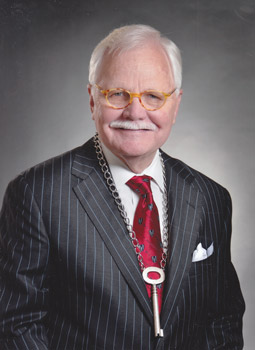An ode to Osler
The influential internist died 100 years ago this December.
Charles S. Bryan, MD, MACP, is known for his encyclopedic knowledge of Sir William Osler. In fact, he's written an actual encyclopedia.
William Osler: An Encyclopedia (Norman Publishing, HistoryofScience.com) will clock in at about 1,000 pages and will be published next April, said Dr. Bryan, whose other titles include Osler: Inspirations from a Great Physician (Oxford University Press, 1997) and The Quotable Osler (American College of Physicians, 2008, with Mark E. Silverman, MD, MACP, and T. Jock Murray, MD, MACP). He is also past president of the American Osler Society, which awarded him the Lifetime Achievement Award in 2010, and a Fellow of the Royal College of Physicians (Edinburgh and London).

The encyclopedia will feature 139 contributors, ranging from residents and medical students to several of the world's distinguished medical historians and biographers, said Dr. Bryan. “All of the contributors have in common the importance of humanism and the humanities to medical practice, with William Osler being a role model in both respects,” he said. The contributors represent 29 states, five Canadian provinces, England, Wales, Scotland, Japan, Australia, and India.
An ACP member throughout his career, Dr. Bryan has earned the College's Laureate Award, Centennial Legacy Award, and Nicholas E. Davies Memorial Scholar Award. The infectious diseases subspecialist is also the Heyward Gibbes distinguished professor emeritus of internal medicine at the University of South Carolina School of Medicine in Columbia.
Dr. Bryan recently spoke with ACP Internist about his fascination with Osler, who died 100 years ago at age 70 years, as well as what insights the storied physician might have if he were alive today.
Q: What initially sparked your interest in Osler?
A: In 1962, I was accepted into the Johns Hopkins University School of Medicine as a transfer from Harvard College in a five-year program that combined the last year of undergraduate studies (so saving one year) and medical school. My father, a physician, never encouraged me to go into medicine but was no doubt pleased by my acceptance into Johns Hopkins and gave me his copy of the third edition of Aequanimitas, which is a compilation of many of Osler's better-known addresses. … This small event led to a lifelong interest in Osler, which was enhanced at Johns Hopkins when I had the privilege of spending a summer on a history-related project supervised by the great medical historian Owsei Temkin, MD. I was honored to receive the William Osler Medal of the American Association for the History of Medicine in 1968 for an essay I had written on medical history.
Like Osler, I was interested in everything about medicine. … I've been fortunate in my career to have transitioned through several stages, as Osler did. The identifiable stages were as follows: First, a desire to master all of medicine, with a foundation in pathology. I did an internship in pathology at Johns Hopkins. Second, desire to become an expert in my field of medicine (which was infectious diseases). Third, beginning at age 50, I was privileged to bear responsibility for the education of medical students and also residents in internal medicine, and I aspired during my eight years as a department chairman to make it the best possible experience for the housestaff under my charge. Then, I became director of a center for bioethics and medical humanities, in which I was able to think and write about ethics and medical history.
In 2008, at age 66, I retired from the University of South Carolina School of Medicine and spent the last eight and a half years of my career in practice in the hospital where I was born, where I did infectious diseases consultations and lots of other things and developed further my interest in medical history and the medical humanities. After nearly 44 years in practice, I retired on my 76th birthday on Jan. 15, 2018, and now devote most of my spare time to medical history and to humanities.
Q: Why did you decide to write an encyclopedia about Osler?
A: Since William Osler died on Dec. 29, 1919, from hemorrhage into an empyema cavity for which he had just undergone surgery, there have been at least 17 biographies and quasi-biographies … and more than 2,000 articles written about Osler, who is often called, if erroneously, the “father of internal medicine” or even the “father of modern medicine.” Memories of Osler are now fading. Many physicians and medical students can barely identify him, if at all. It occurred to me to pull together in the form of an encyclopedia reminiscences of Osler by his contemporaries, short biographical sketches of his contemporaries, summaries and comments on all of Osler's nontechnical writings, and also various personalities and ideas drawn from history that affected Osler's mindset.
Q: Why is he so influential to you?
A: Osler is important in several regards. First, Osler and his contemporaries set the bar, the gold standard, for a model sometimes called “the Oslerian internist,” a seemingly omniscient person who grasps just about everything important to the practice of medicine, who has a seemingly encyclopedic knowledge of medicine.
The second way in which Osler influenced my life was as an exemplar of personal effectiveness. This was a theme of my book, Osler: Inspirations from a Great Physician, in which separate chapters deal with time management, career planning, mentoring, maintaining a positive attitude, teaching and learning, caring appropriately, communicating effectively, and keeping life in balance. In all of these areas, Osler modeled, and also wrote about, the components of what might be called an “effective person,” or as psychologist Abraham Maslow put it, a “self-actualized person.”
A third dimension in which Osler has influenced my life concerns his musings on the big questions of human existence. These include the nature of ultimate reality, the nature of faith and the role of faith in our lives, and even the survivability of our species, as is now increasingly stressed by the downsides of scientific progress, including new weaponry.
Q: What might Osler say if he were alive today?
A: He was not especially visionary. Indeed, he has been criticized for his idea of living in “day-tight compartments,” that is, living for today only as opposed to planning, planning, and planning for the future. However, we can be sure about some things.
In his last public address, given on “the old humanities and the new science” as the presidential address to the Classical Association of Great Britain on May 16, 1919, at Oxford, Osler, while encouraging more communication between the humanities and the sciences, despairs over the destructiveness of modern weaponry, weaponry unleashed during the Great War (World War I), which claimed the life of the Oslers' son, Revere. Osler asks whether science will ultimately prove to be a force for good or evil. He concludes that address with a paragraph (his last paragraph published during his lifetime) with an appeal to humanity. Namely, by a love of humanity (philanthropia) and love of science and technology (philotechnia), humankind might somehow acquire the wisdom (philosophia) to use science for beneficent purposes and to survive as a species.
Today, of course, these issues have become heightened by scientific advances of which Osler could not even dream. On the one hand, we have nuclear weaponry capable of destroying life on Earth within an hour. On the other hand, we have molecular technology capable of creating new life forms for whatever purpose we see fit. Thus, science must be informed by humanism, broadly understood as promotion of human flourishing.
As we scan the horizon today, we see in our midst many articulate persons, many idealistic, well-meaning persons. These include, for example, scientists who study global warming and whose voices need to be heard. Osler's biographer, the Canadian historian Michael Bliss, wrote on “medical exceptionalism.” By this, he meant that medicine is a singular exception to the generalization that so much of what we humans do takes us backwards rather than forwards.
Q: What would Osler think of ACP's efforts in medical education and advocacy?
A: Osler did not especially enjoy administrative work, but he committed himself wholeheartedly to organizations that promoted the public interest. Osler would of course rejoice in the educational programs and especially the continuing education programs sponsored by the ACP (I have perhaps followed the Oslerian mold by participating in all of the MKSAP programs starting with MKSAP 2). He would also endorse the ACP's mission to concern itself not just with the economic concerns of doctors, as so many organizations do, but with larger issues, including access to health care and, more generally, the beneficent use of science. I think that he would also see the ACP as a dynamic organization, capable of repurposing itself to meet the changing needs of society and the world at large.



